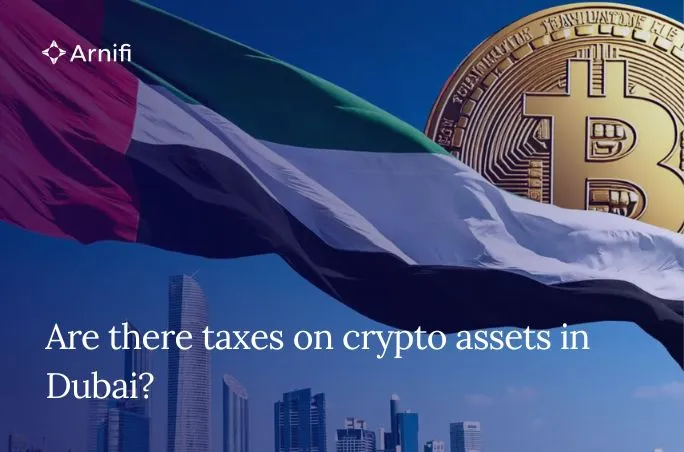Are there taxes on crypto assets in Dubai?
by Ishika Bhandari Nov 14, 2025  6 MIN READ
6 MIN READ

Table of contents
Dubai has emerged as one of the top destinations for cryptocurrency investors, blockchain startups, and digital property companies in the world. Such an attractive base for international crypto activity is mainly due to its progressive policies, strategic location, and low tax environment. However, the question that gives rise to more than any other is: Do crypto assets get taxed in Dubai?
In this article, we shall dissect the current status of Dubai crypto regulations, tax implications regarding individuals and companies, and any changes that shall be made by, say, 2028.
The current tax landscape for individuals
For an individual investor or trader in digital assets, Dubai provides one of the most beneficial tax regimes in the world.
The UAE does not tax personal incomes or capital gains; hence, profits from the purchase, holding, or selling of cryptocurrencies are not taxed. You buy Bitcoin or Ethereum, sell it at a profit, and keep every cent made therefrom.
Further, no value-added tax (VAT) becomes applicable on private trading or investment in cryptocurrency. As long as the activity is for personal investment and not structured as a business, there are no direct taxes or indirect taxes to pay.
This particular policy has enticed a growing number of international crypto investors toward Dubai. With a supportive regulatory environment and 0% for personal tax, the city positioned itself as the number one international hub for digital assets.
Crypto businesses and taxation
For the entity’s level View of Incidence and Tax Incident on Crypto Activities, it is exchange-like, working events, or development of Blockchain.
The UAE introduced in June 2023 the federal corporate tax at the standard rate of 9% on business profits exceeding AED 375,000 (roughly USD 102,000), thereby capturing most of the crypto businesses.
However, the free zones in Dubai provide several advantages. Entities registered in free zones such as the Dubai Multi Commodities Centre (DMCC) or the Dubai International Financial Centre (DIFC) may qualify for 0% corporate tax under certain conditions, such as having adequate economic substance and not conducting direct business with the UAE mainland.
Some crypto-related activities may attract VAT as well, particularly where a company sells goods or services for crypto, for example, mining hardware or providing consulting services. The standard VAT rate in the UAE is 5 percent.
While individuals operate in a tax-free environment, businesses, depending on their structure and activities, labor under corporate tax as well as VAT.
Key considerations for investors and entrepreneurs
Dubai is justified in being called crypto-friendly; nevertheless, details of tax and compliance must be understood. Here are five important considerations:
1. Residency and home-country obligations
Living in Dubai does not clear you of all tax obligations in the other country. Some countries tax their citizens or residents on worldwide income regardless of where they live. To avail of Dubai’s tax jurisdiction fully, establishing UAE tax residency and understanding how your home country treats offshore income is important.
2. Personal investment vs business activity
The UAE draws a line between casual investors and professional traders. If your crypto trading is pretty frequent, organized, or if you have significant infrastructure, it can be regarded as a business rather than a personal investment, and corporate tax might apply to it.
3. Free-zone advantages
Establishing a company in specialized free zones within Dubai can minimize or eliminate corporate tax. These areas also allow for regulatory clarity, licensing in digital assets, and access to the Virtual Assets Regulatory Authority (VARA).
4. VAT and indirect taxes
Generally, crypto investment is not subject to VAT, but the business services associated therewith, blockchain consulting or software development, fall under VAT laws. Companies need to register for VAT when taxable supplies exceed the AED 375,000 annual threshold.
5. Compliance with VARA regulations
Dubai’s Virtual Assets Regulatory Authority governs licensing and supervision related to digital asset activities. Organizations must comply with the anti-money-laundering (AML) and know-your-customer (KYC) regulations. Compliance remains obligatory even in low taxation.
Global developments: Data sharing by 2028
While Dubai’s tax regime remains quite light, international regulations evolve. Recently, the UAE has declared it will start sharing financial information through digital assets and cryptocurrencies worldwide by 2028.
This comes within the wider scope of the Common Reporting Standard (CRS) 2.0 framework established by the Organisation for Economic Co-operation and Development (OECD), which requires participating countries to automatically exchange financial account information, including holding and transaction details about digital assets.
Increase transparency globally and prevent tax evasion. What does this mean for investors? While the crypto profits may not be taxed by Dubai, the information regarding the holding and trading will likely be shared with tax administrators in other countries.
But most importantly, it does not mean that the UAE is going to start taxing crypto assets soon. It actually reflects on greater international cooperation towards more financial accountability.
What this means for different crypto users
Individual investors
- Invest personal crypto without income or capital gains tax liabilities.
- No VAT charges exist for individual trades or holdings.
- Investors must keep proof of residence in the UAE with well-kept records. Tax obligations might still exist in your country of citizenship or residence.
Crypto businesses
- For income of more than AED 375,000, the corporation tax is applied at 9 percent.
- Qualifying free-zone companies can attain the 0 percent rate if compliant.
- VAT may apply to services, software, or mining operations.
- Compliance with VARA, AML, and KYC requirements.
Expatriates and entrepreneurs
- Dubai still holds the interest of many venture capitalists in the field of cryptocurrencies.
- Establish residency for the incentive of legally attaining tax benefits.
- Be informed of global changes in reporting, as it deals with possible home-country tax rules.
Final thoughts
So, are there taxes on crypto assets in Dubai? The answer is no for individual investors. There are no taxes on crypto assets held by residents. The UAE has no income or capital gains tax, so residents can hold, trade, and profit from cryptocurrencies while avoiding direct taxation.
For businesses, a flat rate of 9 percent holds good for corporate taxation; however, many companies still enjoy full exemptions under qualifying conditions due to their location in Dubai’s free zones.
The emerging global data-sharing framework will mark another chapter toward even greater transparency, meaning that, soon enough, foreign tax authorities will have much better insight into digital asset holdings. However, Dubai itself is still committed to remaining a business-friendly and innovation-driven ecosystem.
In summary, Dubai continues to offer a tax-efficient and secure environment for crypto investors as well as companies. The combination of zero personal taxes and competitive corporate rates with clear regulatory guidance makes this one of the most attractive cities in the world for digital finance.
Top UAE Packages

Related Articles
Top UAE Packages



